Risks and Ethical Issues In A Company
VerifiedAdded on 2022/07/28
|9
|2300
|21
AI Summary
please reach all requirments asked in attached file
Contribute Materials
Your contribution can guide someone’s learning journey. Share your
documents today.

Student’s Last Name 1
Risks and Ethical Issues
By (Name)
Course
Professor
Unit
Date
Risks and Ethical Issues
By (Name)
Course
Professor
Unit
Date
Secure Best Marks with AI Grader
Need help grading? Try our AI Grader for instant feedback on your assignments.
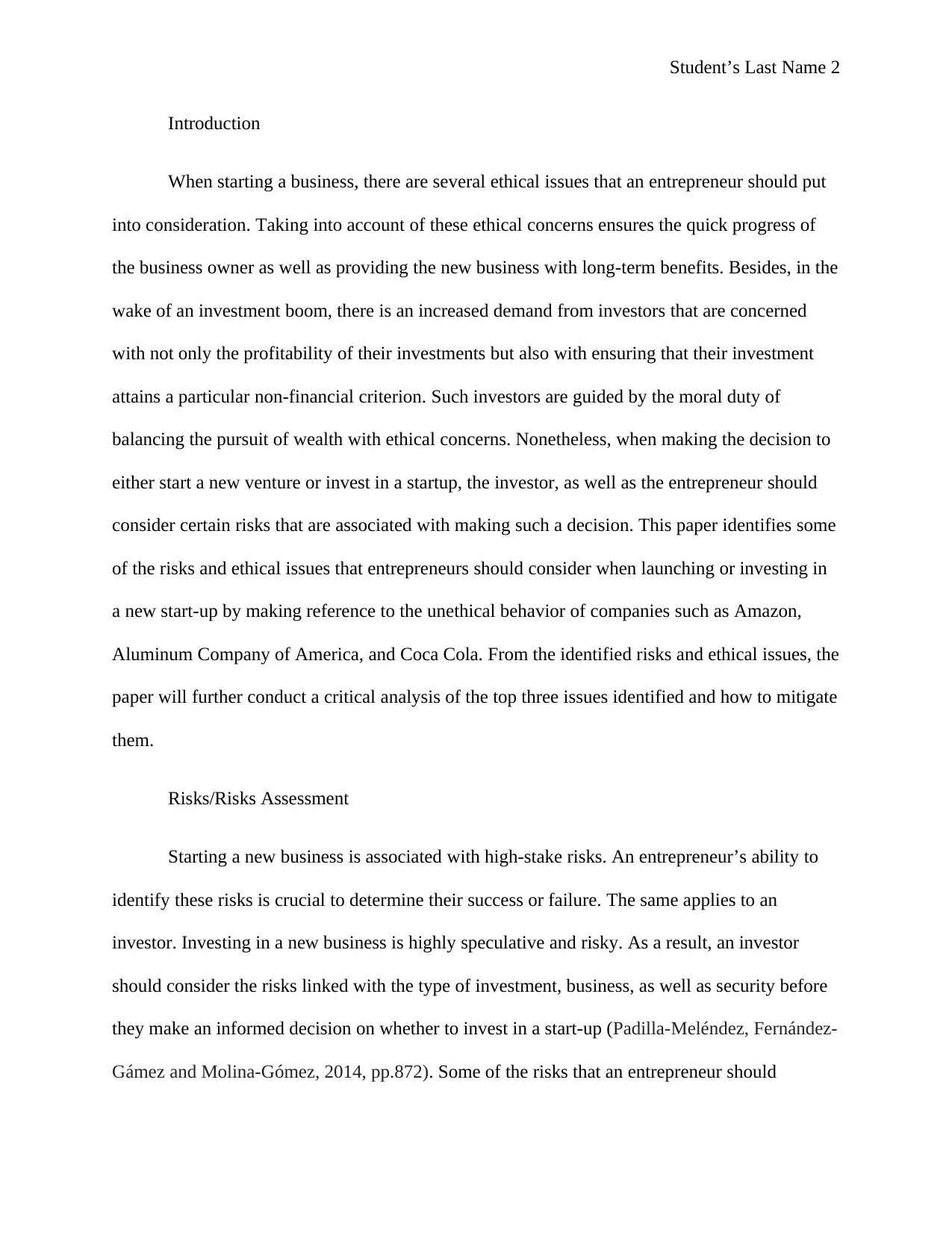
Student’s Last Name 2
Introduction
When starting a business, there are several ethical issues that an entrepreneur should put
into consideration. Taking into account of these ethical concerns ensures the quick progress of
the business owner as well as providing the new business with long-term benefits. Besides, in the
wake of an investment boom, there is an increased demand from investors that are concerned
with not only the profitability of their investments but also with ensuring that their investment
attains a particular non-financial criterion. Such investors are guided by the moral duty of
balancing the pursuit of wealth with ethical concerns. Nonetheless, when making the decision to
either start a new venture or invest in a startup, the investor, as well as the entrepreneur should
consider certain risks that are associated with making such a decision. This paper identifies some
of the risks and ethical issues that entrepreneurs should consider when launching or investing in
a new start-up by making reference to the unethical behavior of companies such as Amazon,
Aluminum Company of America, and Coca Cola. From the identified risks and ethical issues, the
paper will further conduct a critical analysis of the top three issues identified and how to mitigate
them.
Risks/Risks Assessment
Starting a new business is associated with high-stake risks. An entrepreneur’s ability to
identify these risks is crucial to determine their success or failure. The same applies to an
investor. Investing in a new business is highly speculative and risky. As a result, an investor
should consider the risks linked with the type of investment, business, as well as security before
they make an informed decision on whether to invest in a start-up (Padilla-Meléndez, Fernández-
Gámez and Molina-Gómez, 2014, pp.872). Some of the risks that an entrepreneur should
Introduction
When starting a business, there are several ethical issues that an entrepreneur should put
into consideration. Taking into account of these ethical concerns ensures the quick progress of
the business owner as well as providing the new business with long-term benefits. Besides, in the
wake of an investment boom, there is an increased demand from investors that are concerned
with not only the profitability of their investments but also with ensuring that their investment
attains a particular non-financial criterion. Such investors are guided by the moral duty of
balancing the pursuit of wealth with ethical concerns. Nonetheless, when making the decision to
either start a new venture or invest in a startup, the investor, as well as the entrepreneur should
consider certain risks that are associated with making such a decision. This paper identifies some
of the risks and ethical issues that entrepreneurs should consider when launching or investing in
a new start-up by making reference to the unethical behavior of companies such as Amazon,
Aluminum Company of America, and Coca Cola. From the identified risks and ethical issues, the
paper will further conduct a critical analysis of the top three issues identified and how to mitigate
them.
Risks/Risks Assessment
Starting a new business is associated with high-stake risks. An entrepreneur’s ability to
identify these risks is crucial to determine their success or failure. The same applies to an
investor. Investing in a new business is highly speculative and risky. As a result, an investor
should consider the risks linked with the type of investment, business, as well as security before
they make an informed decision on whether to invest in a start-up (Padilla-Meléndez, Fernández-
Gámez and Molina-Gómez, 2014, pp.872). Some of the risks that an entrepreneur should
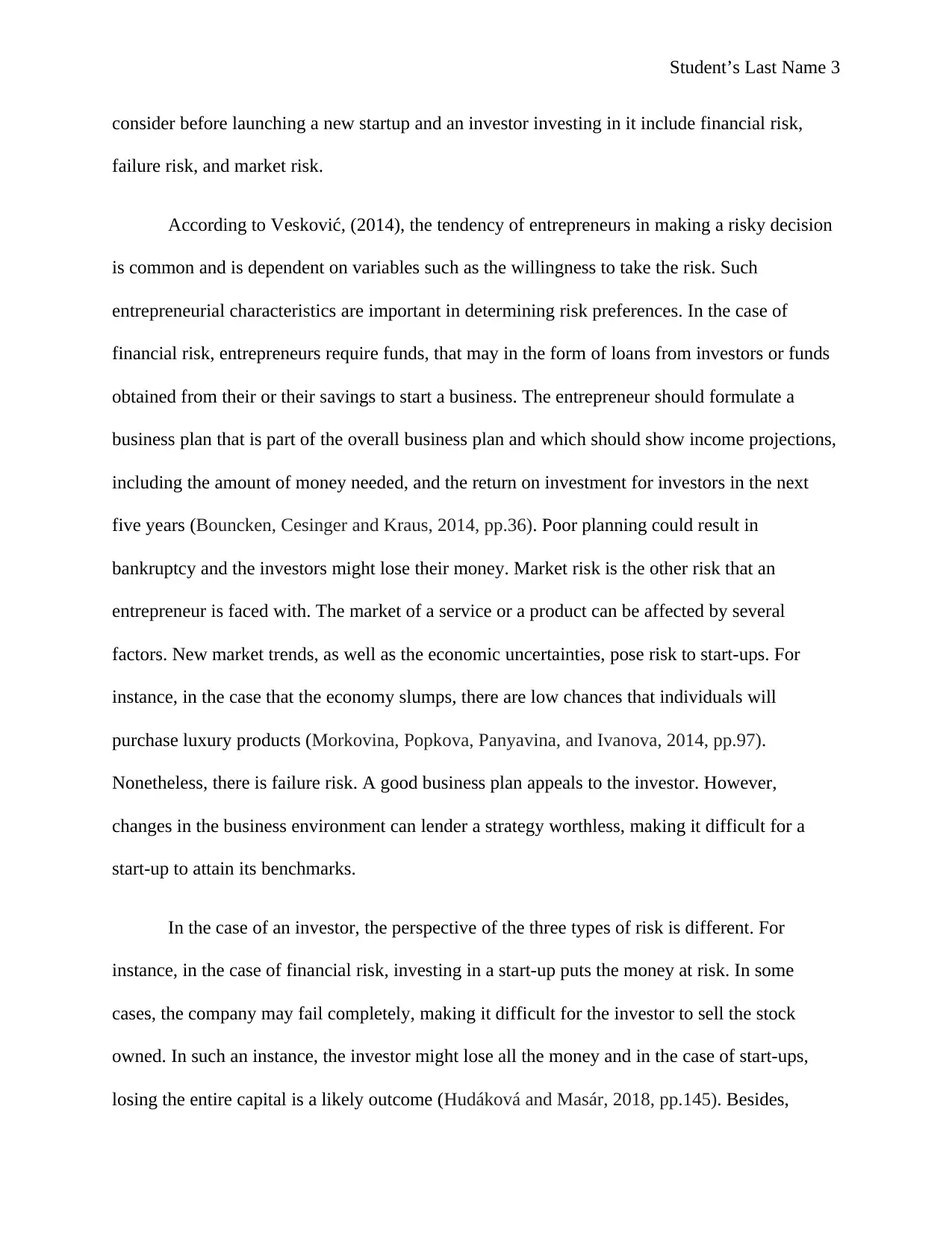
Student’s Last Name 3
consider before launching a new startup and an investor investing in it include financial risk,
failure risk, and market risk.
According to Vesković, (2014), the tendency of entrepreneurs in making a risky decision
is common and is dependent on variables such as the willingness to take the risk. Such
entrepreneurial characteristics are important in determining risk preferences. In the case of
financial risk, entrepreneurs require funds, that may in the form of loans from investors or funds
obtained from their or their savings to start a business. The entrepreneur should formulate a
business plan that is part of the overall business plan and which should show income projections,
including the amount of money needed, and the return on investment for investors in the next
five years (Bouncken, Cesinger and Kraus, 2014, pp.36). Poor planning could result in
bankruptcy and the investors might lose their money. Market risk is the other risk that an
entrepreneur is faced with. The market of a service or a product can be affected by several
factors. New market trends, as well as the economic uncertainties, pose risk to start-ups. For
instance, in the case that the economy slumps, there are low chances that individuals will
purchase luxury products (Morkovina, Popkova, Panyavina, and Ivanova, 2014, pp.97).
Nonetheless, there is failure risk. A good business plan appeals to the investor. However,
changes in the business environment can lender a strategy worthless, making it difficult for a
start-up to attain its benchmarks.
In the case of an investor, the perspective of the three types of risk is different. For
instance, in the case of financial risk, investing in a start-up puts the money at risk. In some
cases, the company may fail completely, making it difficult for the investor to sell the stock
owned. In such an instance, the investor might lose all the money and in the case of start-ups,
losing the entire capital is a likely outcome (Hudáková and Masár, 2018, pp.145). Besides,
consider before launching a new startup and an investor investing in it include financial risk,
failure risk, and market risk.
According to Vesković, (2014), the tendency of entrepreneurs in making a risky decision
is common and is dependent on variables such as the willingness to take the risk. Such
entrepreneurial characteristics are important in determining risk preferences. In the case of
financial risk, entrepreneurs require funds, that may in the form of loans from investors or funds
obtained from their or their savings to start a business. The entrepreneur should formulate a
business plan that is part of the overall business plan and which should show income projections,
including the amount of money needed, and the return on investment for investors in the next
five years (Bouncken, Cesinger and Kraus, 2014, pp.36). Poor planning could result in
bankruptcy and the investors might lose their money. Market risk is the other risk that an
entrepreneur is faced with. The market of a service or a product can be affected by several
factors. New market trends, as well as the economic uncertainties, pose risk to start-ups. For
instance, in the case that the economy slumps, there are low chances that individuals will
purchase luxury products (Morkovina, Popkova, Panyavina, and Ivanova, 2014, pp.97).
Nonetheless, there is failure risk. A good business plan appeals to the investor. However,
changes in the business environment can lender a strategy worthless, making it difficult for a
start-up to attain its benchmarks.
In the case of an investor, the perspective of the three types of risk is different. For
instance, in the case of financial risk, investing in a start-up puts the money at risk. In some
cases, the company may fail completely, making it difficult for the investor to sell the stock
owned. In such an instance, the investor might lose all the money and in the case of start-ups,
losing the entire capital is a likely outcome (Hudáková and Masár, 2018, pp.145). Besides,
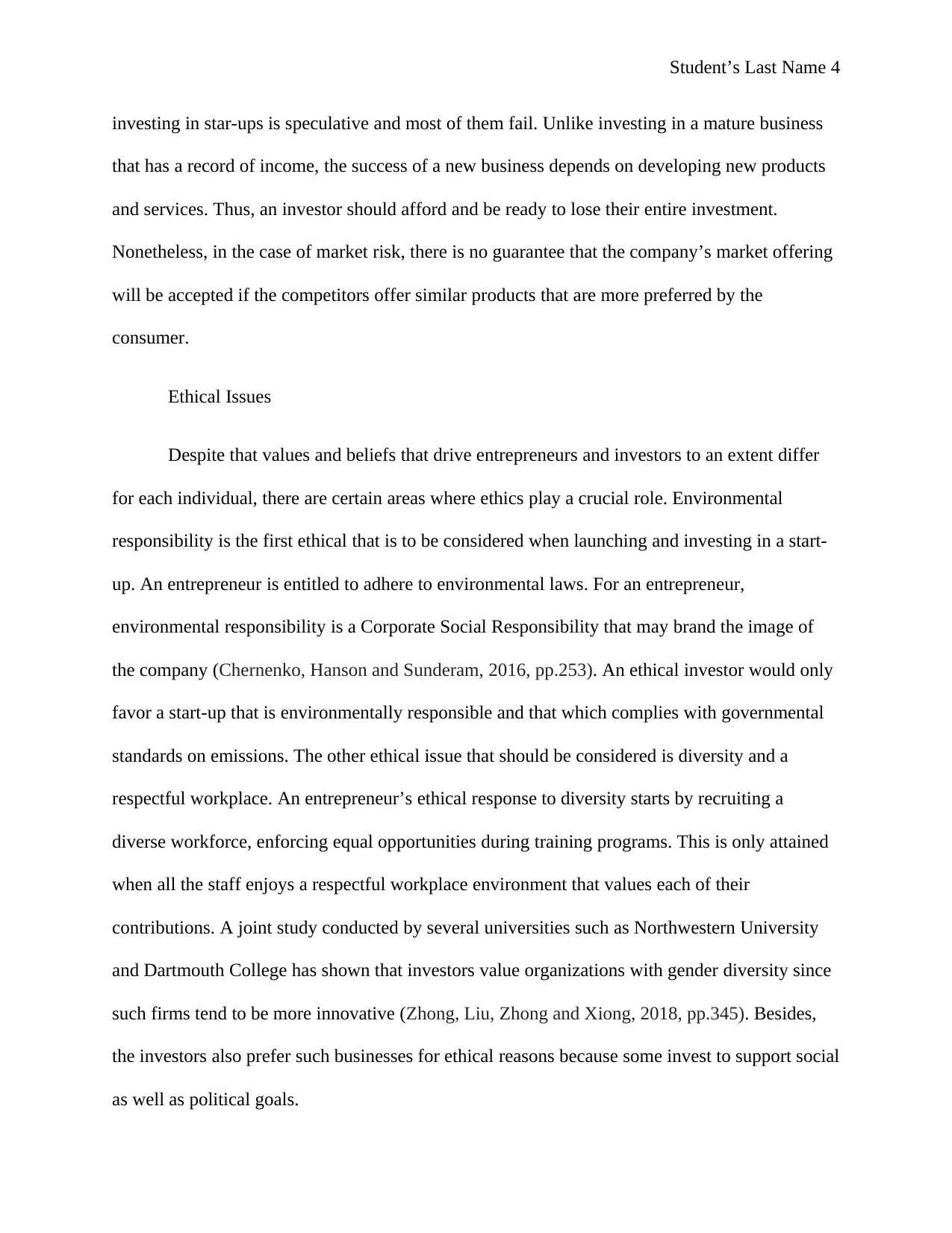
Student’s Last Name 4
investing in star-ups is speculative and most of them fail. Unlike investing in a mature business
that has a record of income, the success of a new business depends on developing new products
and services. Thus, an investor should afford and be ready to lose their entire investment.
Nonetheless, in the case of market risk, there is no guarantee that the company’s market offering
will be accepted if the competitors offer similar products that are more preferred by the
consumer.
Ethical Issues
Despite that values and beliefs that drive entrepreneurs and investors to an extent differ
for each individual, there are certain areas where ethics play a crucial role. Environmental
responsibility is the first ethical that is to be considered when launching and investing in a start-
up. An entrepreneur is entitled to adhere to environmental laws. For an entrepreneur,
environmental responsibility is a Corporate Social Responsibility that may brand the image of
the company (Chernenko, Hanson and Sunderam, 2016, pp.253). An ethical investor would only
favor a start-up that is environmentally responsible and that which complies with governmental
standards on emissions. The other ethical issue that should be considered is diversity and a
respectful workplace. An entrepreneur’s ethical response to diversity starts by recruiting a
diverse workforce, enforcing equal opportunities during training programs. This is only attained
when all the staff enjoys a respectful workplace environment that values each of their
contributions. A joint study conducted by several universities such as Northwestern University
and Dartmouth College has shown that investors value organizations with gender diversity since
such firms tend to be more innovative (Zhong, Liu, Zhong and Xiong, 2018, pp.345). Besides,
the investors also prefer such businesses for ethical reasons because some invest to support social
as well as political goals.
investing in star-ups is speculative and most of them fail. Unlike investing in a mature business
that has a record of income, the success of a new business depends on developing new products
and services. Thus, an investor should afford and be ready to lose their entire investment.
Nonetheless, in the case of market risk, there is no guarantee that the company’s market offering
will be accepted if the competitors offer similar products that are more preferred by the
consumer.
Ethical Issues
Despite that values and beliefs that drive entrepreneurs and investors to an extent differ
for each individual, there are certain areas where ethics play a crucial role. Environmental
responsibility is the first ethical that is to be considered when launching and investing in a start-
up. An entrepreneur is entitled to adhere to environmental laws. For an entrepreneur,
environmental responsibility is a Corporate Social Responsibility that may brand the image of
the company (Chernenko, Hanson and Sunderam, 2016, pp.253). An ethical investor would only
favor a start-up that is environmentally responsible and that which complies with governmental
standards on emissions. The other ethical issue that should be considered is diversity and a
respectful workplace. An entrepreneur’s ethical response to diversity starts by recruiting a
diverse workforce, enforcing equal opportunities during training programs. This is only attained
when all the staff enjoys a respectful workplace environment that values each of their
contributions. A joint study conducted by several universities such as Northwestern University
and Dartmouth College has shown that investors value organizations with gender diversity since
such firms tend to be more innovative (Zhong, Liu, Zhong and Xiong, 2018, pp.345). Besides,
the investors also prefer such businesses for ethical reasons because some invest to support social
as well as political goals.
Secure Best Marks with AI Grader
Need help grading? Try our AI Grader for instant feedback on your assignments.
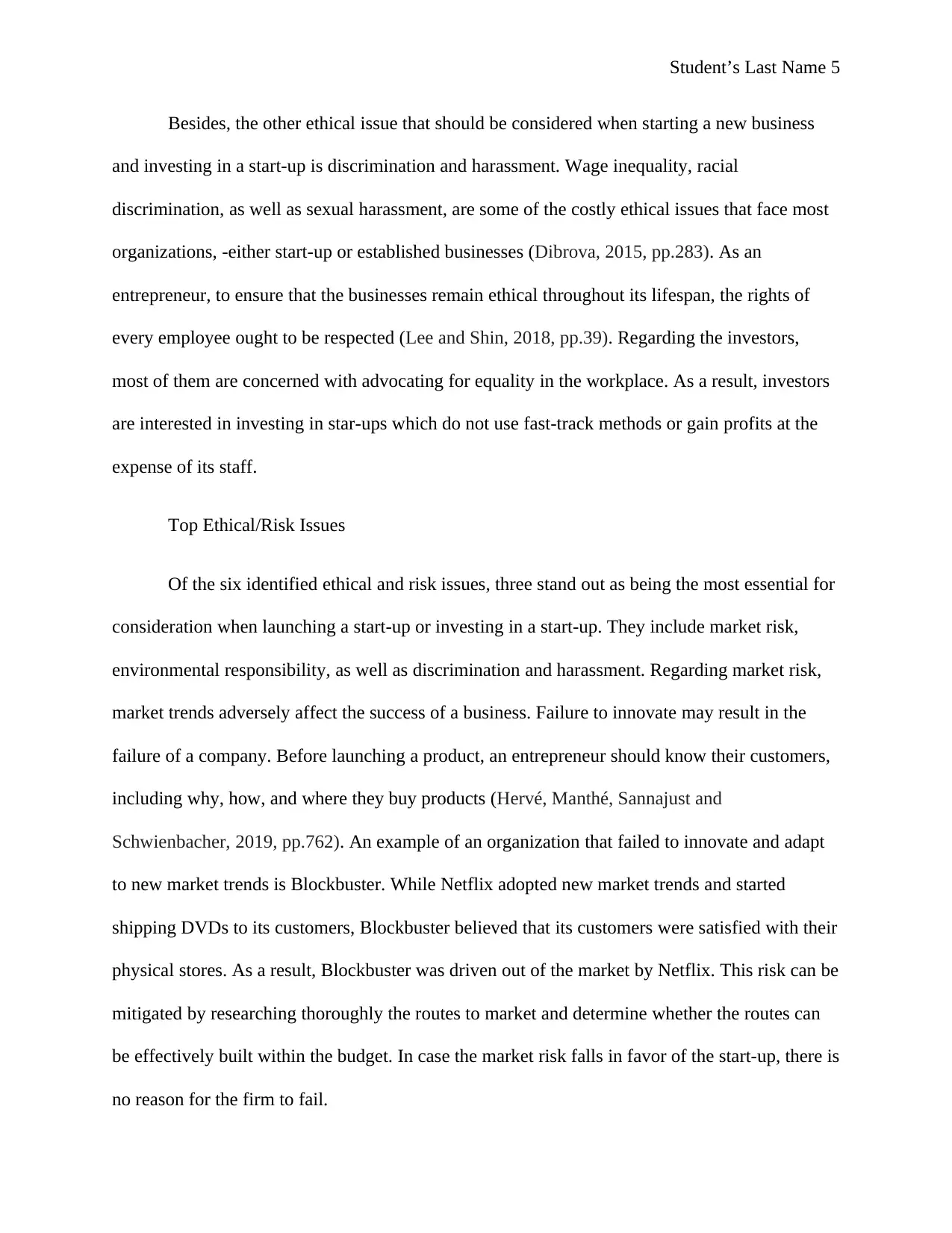
Student’s Last Name 5
Besides, the other ethical issue that should be considered when starting a new business
and investing in a start-up is discrimination and harassment. Wage inequality, racial
discrimination, as well as sexual harassment, are some of the costly ethical issues that face most
organizations, -either start-up or established businesses (Dibrova, 2015, pp.283). As an
entrepreneur, to ensure that the businesses remain ethical throughout its lifespan, the rights of
every employee ought to be respected (Lee and Shin, 2018, pp.39). Regarding the investors,
most of them are concerned with advocating for equality in the workplace. As a result, investors
are interested in investing in star-ups which do not use fast-track methods or gain profits at the
expense of its staff.
Top Ethical/Risk Issues
Of the six identified ethical and risk issues, three stand out as being the most essential for
consideration when launching a start-up or investing in a start-up. They include market risk,
environmental responsibility, as well as discrimination and harassment. Regarding market risk,
market trends adversely affect the success of a business. Failure to innovate may result in the
failure of a company. Before launching a product, an entrepreneur should know their customers,
including why, how, and where they buy products (Hervé, Manthé, Sannajust and
Schwienbacher, 2019, pp.762). An example of an organization that failed to innovate and adapt
to new market trends is Blockbuster. While Netflix adopted new market trends and started
shipping DVDs to its customers, Blockbuster believed that its customers were satisfied with their
physical stores. As a result, Blockbuster was driven out of the market by Netflix. This risk can be
mitigated by researching thoroughly the routes to market and determine whether the routes can
be effectively built within the budget. In case the market risk falls in favor of the start-up, there is
no reason for the firm to fail.
Besides, the other ethical issue that should be considered when starting a new business
and investing in a start-up is discrimination and harassment. Wage inequality, racial
discrimination, as well as sexual harassment, are some of the costly ethical issues that face most
organizations, -either start-up or established businesses (Dibrova, 2015, pp.283). As an
entrepreneur, to ensure that the businesses remain ethical throughout its lifespan, the rights of
every employee ought to be respected (Lee and Shin, 2018, pp.39). Regarding the investors,
most of them are concerned with advocating for equality in the workplace. As a result, investors
are interested in investing in star-ups which do not use fast-track methods or gain profits at the
expense of its staff.
Top Ethical/Risk Issues
Of the six identified ethical and risk issues, three stand out as being the most essential for
consideration when launching a start-up or investing in a start-up. They include market risk,
environmental responsibility, as well as discrimination and harassment. Regarding market risk,
market trends adversely affect the success of a business. Failure to innovate may result in the
failure of a company. Before launching a product, an entrepreneur should know their customers,
including why, how, and where they buy products (Hervé, Manthé, Sannajust and
Schwienbacher, 2019, pp.762). An example of an organization that failed to innovate and adapt
to new market trends is Blockbuster. While Netflix adopted new market trends and started
shipping DVDs to its customers, Blockbuster believed that its customers were satisfied with their
physical stores. As a result, Blockbuster was driven out of the market by Netflix. This risk can be
mitigated by researching thoroughly the routes to market and determine whether the routes can
be effectively built within the budget. In case the market risk falls in favor of the start-up, there is
no reason for the firm to fail.
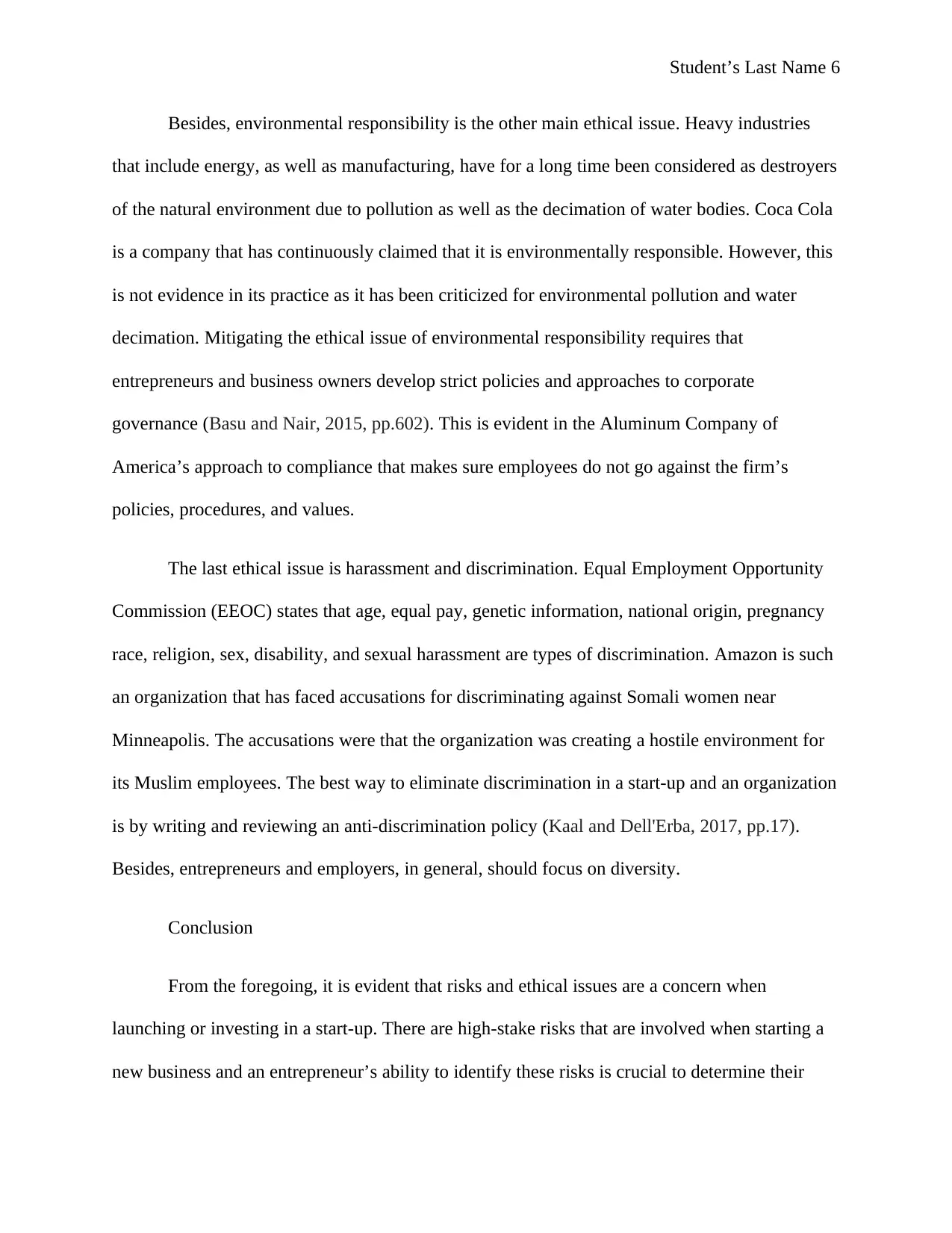
Student’s Last Name 6
Besides, environmental responsibility is the other main ethical issue. Heavy industries
that include energy, as well as manufacturing, have for a long time been considered as destroyers
of the natural environment due to pollution as well as the decimation of water bodies. Coca Cola
is a company that has continuously claimed that it is environmentally responsible. However, this
is not evidence in its practice as it has been criticized for environmental pollution and water
decimation. Mitigating the ethical issue of environmental responsibility requires that
entrepreneurs and business owners develop strict policies and approaches to corporate
governance (Basu and Nair, 2015, pp.602). This is evident in the Aluminum Company of
America’s approach to compliance that makes sure employees do not go against the firm’s
policies, procedures, and values.
The last ethical issue is harassment and discrimination. Equal Employment Opportunity
Commission (EEOC) states that age, equal pay, genetic information, national origin, pregnancy
race, religion, sex, disability, and sexual harassment are types of discrimination. Amazon is such
an organization that has faced accusations for discriminating against Somali women near
Minneapolis. The accusations were that the organization was creating a hostile environment for
its Muslim employees. The best way to eliminate discrimination in a start-up and an organization
is by writing and reviewing an anti-discrimination policy (Kaal and Dell'Erba, 2017, pp.17).
Besides, entrepreneurs and employers, in general, should focus on diversity.
Conclusion
From the foregoing, it is evident that risks and ethical issues are a concern when
launching or investing in a start-up. There are high-stake risks that are involved when starting a
new business and an entrepreneur’s ability to identify these risks is crucial to determine their
Besides, environmental responsibility is the other main ethical issue. Heavy industries
that include energy, as well as manufacturing, have for a long time been considered as destroyers
of the natural environment due to pollution as well as the decimation of water bodies. Coca Cola
is a company that has continuously claimed that it is environmentally responsible. However, this
is not evidence in its practice as it has been criticized for environmental pollution and water
decimation. Mitigating the ethical issue of environmental responsibility requires that
entrepreneurs and business owners develop strict policies and approaches to corporate
governance (Basu and Nair, 2015, pp.602). This is evident in the Aluminum Company of
America’s approach to compliance that makes sure employees do not go against the firm’s
policies, procedures, and values.
The last ethical issue is harassment and discrimination. Equal Employment Opportunity
Commission (EEOC) states that age, equal pay, genetic information, national origin, pregnancy
race, religion, sex, disability, and sexual harassment are types of discrimination. Amazon is such
an organization that has faced accusations for discriminating against Somali women near
Minneapolis. The accusations were that the organization was creating a hostile environment for
its Muslim employees. The best way to eliminate discrimination in a start-up and an organization
is by writing and reviewing an anti-discrimination policy (Kaal and Dell'Erba, 2017, pp.17).
Besides, entrepreneurs and employers, in general, should focus on diversity.
Conclusion
From the foregoing, it is evident that risks and ethical issues are a concern when
launching or investing in a start-up. There are high-stake risks that are involved when starting a
new business and an entrepreneur’s ability to identify these risks is crucial to determine their
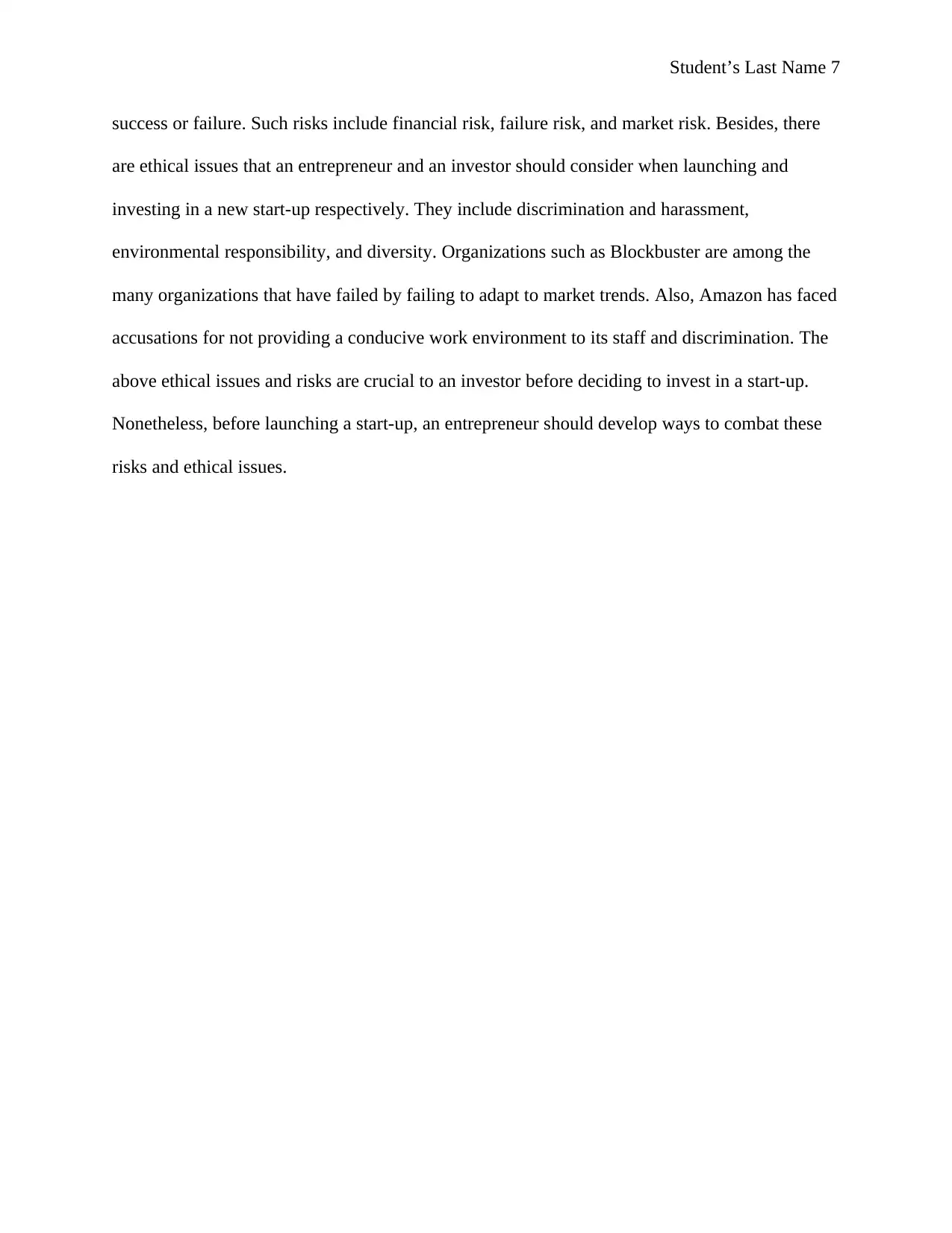
Student’s Last Name 7
success or failure. Such risks include financial risk, failure risk, and market risk. Besides, there
are ethical issues that an entrepreneur and an investor should consider when launching and
investing in a new start-up respectively. They include discrimination and harassment,
environmental responsibility, and diversity. Organizations such as Blockbuster are among the
many organizations that have failed by failing to adapt to market trends. Also, Amazon has faced
accusations for not providing a conducive work environment to its staff and discrimination. The
above ethical issues and risks are crucial to an investor before deciding to invest in a start-up.
Nonetheless, before launching a start-up, an entrepreneur should develop ways to combat these
risks and ethical issues.
success or failure. Such risks include financial risk, failure risk, and market risk. Besides, there
are ethical issues that an entrepreneur and an investor should consider when launching and
investing in a new start-up respectively. They include discrimination and harassment,
environmental responsibility, and diversity. Organizations such as Blockbuster are among the
many organizations that have failed by failing to adapt to market trends. Also, Amazon has faced
accusations for not providing a conducive work environment to its staff and discrimination. The
above ethical issues and risks are crucial to an investor before deciding to invest in a start-up.
Nonetheless, before launching a start-up, an entrepreneur should develop ways to combat these
risks and ethical issues.
Paraphrase This Document
Need a fresh take? Get an instant paraphrase of this document with our AI Paraphraser
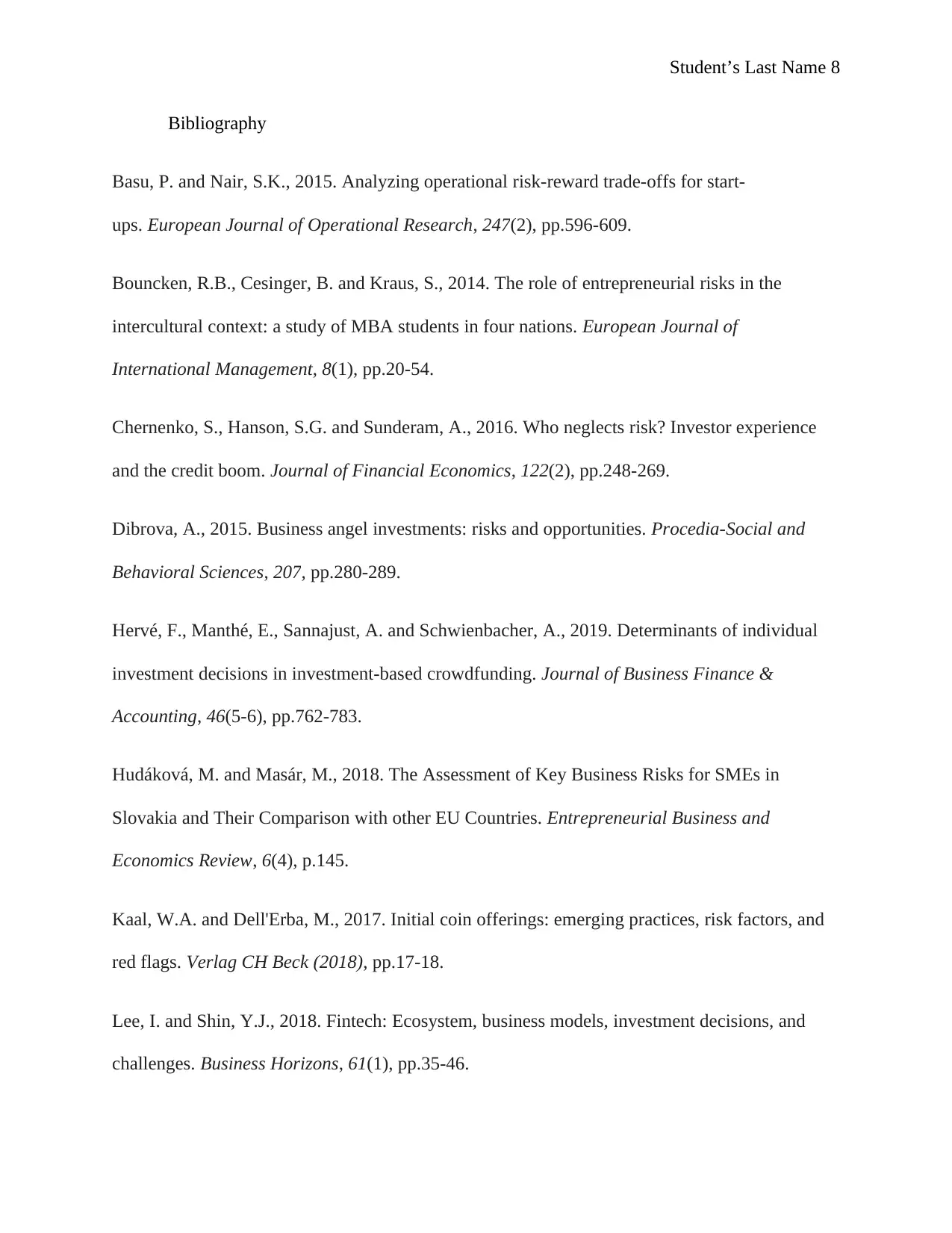
Student’s Last Name 8
Bibliography
Basu, P. and Nair, S.K., 2015. Analyzing operational risk-reward trade-offs for start-
ups. European Journal of Operational Research, 247(2), pp.596-609.
Bouncken, R.B., Cesinger, B. and Kraus, S., 2014. The role of entrepreneurial risks in the
intercultural context: a study of MBA students in four nations. European Journal of
International Management, 8(1), pp.20-54.
Chernenko, S., Hanson, S.G. and Sunderam, A., 2016. Who neglects risk? Investor experience
and the credit boom. Journal of Financial Economics, 122(2), pp.248-269.
Dibrova, A., 2015. Business angel investments: risks and opportunities. Procedia-Social and
Behavioral Sciences, 207, pp.280-289.
Hervé, F., Manthé, E., Sannajust, A. and Schwienbacher, A., 2019. Determinants of individual
investment decisions in investment‐based crowdfunding. Journal of Business Finance &
Accounting, 46(5-6), pp.762-783.
Hudáková, M. and Masár, M., 2018. The Assessment of Key Business Risks for SMEs in
Slovakia and Their Comparison with other EU Countries. Entrepreneurial Business and
Economics Review, 6(4), p.145.
Kaal, W.A. and Dell'Erba, M., 2017. Initial coin offerings: emerging practices, risk factors, and
red flags. Verlag CH Beck (2018), pp.17-18.
Lee, I. and Shin, Y.J., 2018. Fintech: Ecosystem, business models, investment decisions, and
challenges. Business Horizons, 61(1), pp.35-46.
Bibliography
Basu, P. and Nair, S.K., 2015. Analyzing operational risk-reward trade-offs for start-
ups. European Journal of Operational Research, 247(2), pp.596-609.
Bouncken, R.B., Cesinger, B. and Kraus, S., 2014. The role of entrepreneurial risks in the
intercultural context: a study of MBA students in four nations. European Journal of
International Management, 8(1), pp.20-54.
Chernenko, S., Hanson, S.G. and Sunderam, A., 2016. Who neglects risk? Investor experience
and the credit boom. Journal of Financial Economics, 122(2), pp.248-269.
Dibrova, A., 2015. Business angel investments: risks and opportunities. Procedia-Social and
Behavioral Sciences, 207, pp.280-289.
Hervé, F., Manthé, E., Sannajust, A. and Schwienbacher, A., 2019. Determinants of individual
investment decisions in investment‐based crowdfunding. Journal of Business Finance &
Accounting, 46(5-6), pp.762-783.
Hudáková, M. and Masár, M., 2018. The Assessment of Key Business Risks for SMEs in
Slovakia and Their Comparison with other EU Countries. Entrepreneurial Business and
Economics Review, 6(4), p.145.
Kaal, W.A. and Dell'Erba, M., 2017. Initial coin offerings: emerging practices, risk factors, and
red flags. Verlag CH Beck (2018), pp.17-18.
Lee, I. and Shin, Y.J., 2018. Fintech: Ecosystem, business models, investment decisions, and
challenges. Business Horizons, 61(1), pp.35-46.
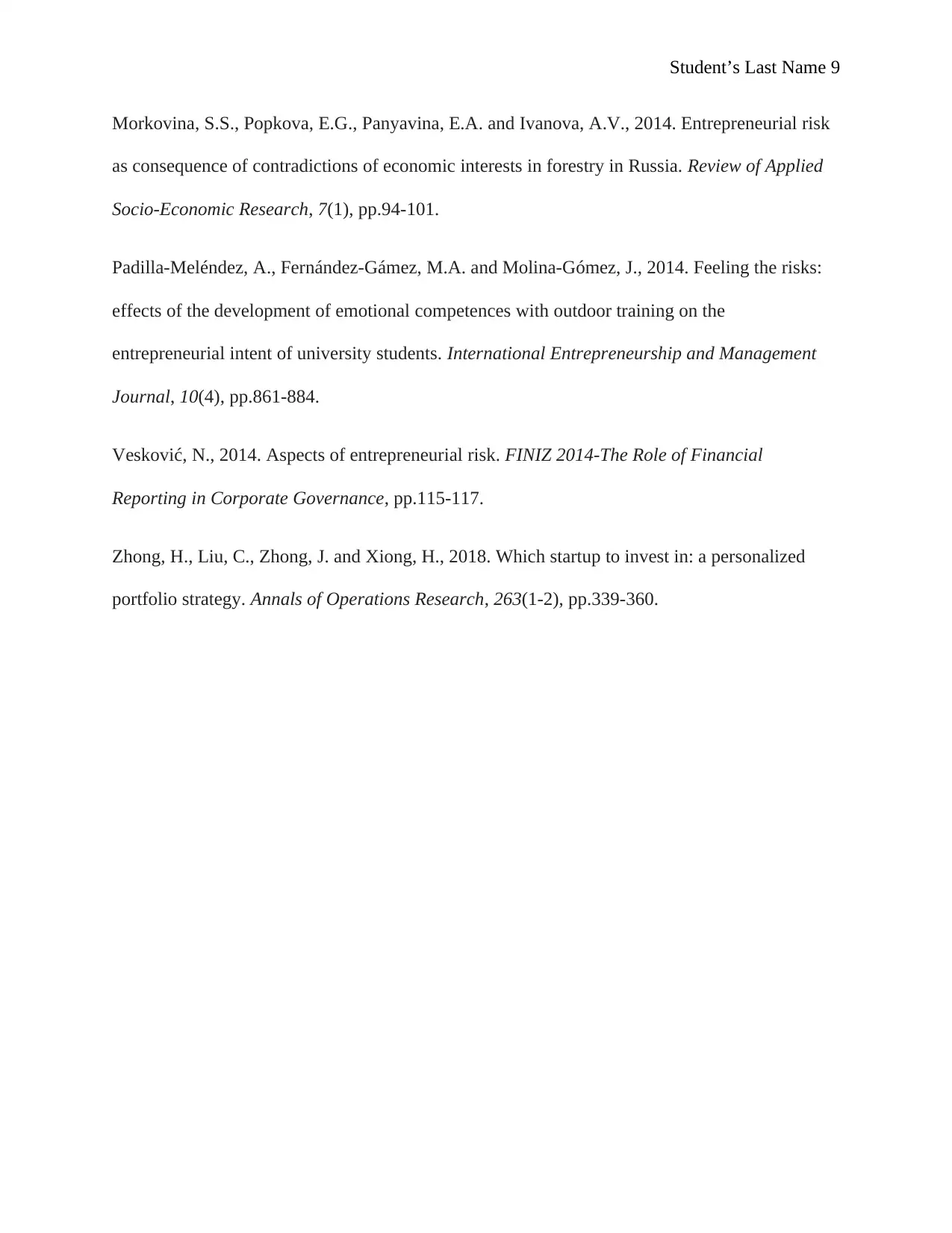
Student’s Last Name 9
Morkovina, S.S., Popkova, E.G., Panyavina, E.A. and Ivanova, A.V., 2014. Entrepreneurial risk
as consequence of contradictions of economic interests in forestry in Russia. Review of Applied
Socio-Economic Research, 7(1), pp.94-101.
Padilla-Meléndez, A., Fernández-Gámez, M.A. and Molina-Gómez, J., 2014. Feeling the risks:
effects of the development of emotional competences with outdoor training on the
entrepreneurial intent of university students. International Entrepreneurship and Management
Journal, 10(4), pp.861-884.
Vesković, N., 2014. Aspects of entrepreneurial risk. FINIZ 2014-The Role of Financial
Reporting in Corporate Governance, pp.115-117.
Zhong, H., Liu, C., Zhong, J. and Xiong, H., 2018. Which startup to invest in: a personalized
portfolio strategy. Annals of Operations Research, 263(1-2), pp.339-360.
Morkovina, S.S., Popkova, E.G., Panyavina, E.A. and Ivanova, A.V., 2014. Entrepreneurial risk
as consequence of contradictions of economic interests in forestry in Russia. Review of Applied
Socio-Economic Research, 7(1), pp.94-101.
Padilla-Meléndez, A., Fernández-Gámez, M.A. and Molina-Gómez, J., 2014. Feeling the risks:
effects of the development of emotional competences with outdoor training on the
entrepreneurial intent of university students. International Entrepreneurship and Management
Journal, 10(4), pp.861-884.
Vesković, N., 2014. Aspects of entrepreneurial risk. FINIZ 2014-The Role of Financial
Reporting in Corporate Governance, pp.115-117.
Zhong, H., Liu, C., Zhong, J. and Xiong, H., 2018. Which startup to invest in: a personalized
portfolio strategy. Annals of Operations Research, 263(1-2), pp.339-360.
1 out of 9
Related Documents
Your All-in-One AI-Powered Toolkit for Academic Success.
+13062052269
info@desklib.com
Available 24*7 on WhatsApp / Email
![[object Object]](/_next/static/media/star-bottom.7253800d.svg)
Unlock your academic potential
© 2024 | Zucol Services PVT LTD | All rights reserved.





